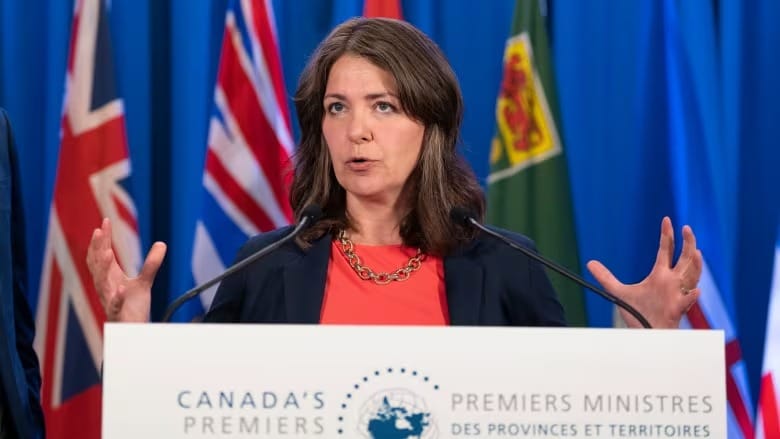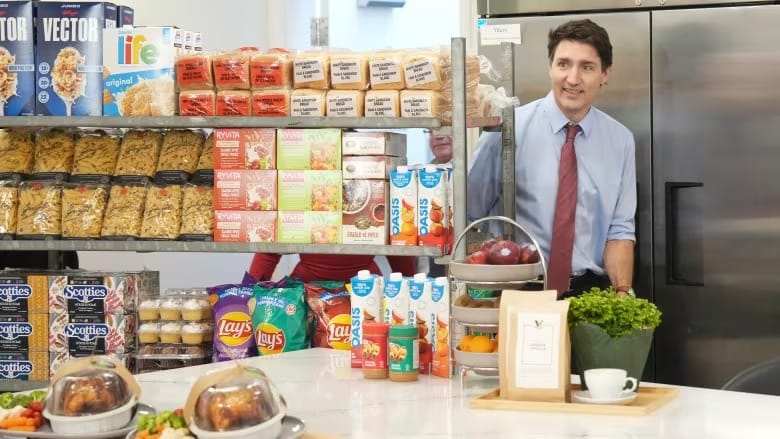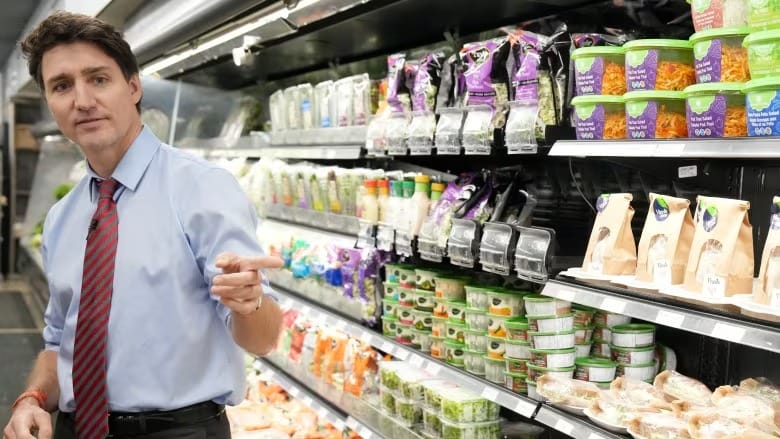Canada should pursue bilateral trade agreements with U.S. and Mexico, says Alberta premier
Danielle Smith questions trilateral deal, cites trade imbalance between the countries

Alberta Premier Danielle Smith has suggested that Canada should consider pursuing bilateral trade agreements with the United States and Mexico as the three countries prepare to review and possibly renegotiate the Canada-United States-Mexico Agreement (CUSMA) in 2026.
"I think there's always been an imbalance between these three partners," Smith said in an interview on Sunday. "Canada and the U.S. have always had more balanced trade."
According to data from the United States Census Bureau, Canada had a trade surplus of about $64 billion USD with the U.S. in 2023, meaning the U.S. purchased more from Canada than it exported to the country. In contrast, Mexico had a trade surplus of about $152.5 billion USD with the U.S. last year.
Smith pointed out that with the incoming Trump administration, the U.S. will likely push for Canada to buy as much from them as they purchase from Canada. "If there's a trade imbalance, it will identify problematic areas," she noted.
Smith echoed similar views shared by Ontario Premier Doug Ford, who proposed cutting Mexico out of the trade agreement and moving toward a bilateral deal with the U.S. to cater to U.S. President-elect Donald Trump's preferences. Ford also criticized Mexico for its growing ties with China, including the country’s invitation for Chinese investment, particularly in the car industry. Washington has raised concerns over Chinese electric vehicle manufacturer BYD scouting locations in Mexico to build factories that could supply the U.S. market.
"The question is: Why would we support continuing in a trilateral agreement if it's going to be imbalanced that way?" Smith asked. "We really should be looking at two bilateral agreements."
Smith suggested that the U.S. could maintain its own agreement with Mexico, while Canada could benefit from a more balanced and constructive trade relationship with the U.S.
Smith’s comments followed those of Doug Ford, who recently proposed that Canada explore a bilateral agreement with the U.S. and criticized Mexico for its growing role as a "backdoor" for Chinese cars. He also suggested Mexico should align its tariffs on Chinese imports with those of Canada and the U.S.
The current CUSMA agreement is set to be reviewed in 2026. During his campaign, Trump promised to renegotiate the deal.
Prime Minister Justin Trudeau, however, recently reiterated that Mexico remains a "solid partner" in trade, acknowledging concerns over Chinese investment but maintaining that trilateral negotiations were the best path forward. "Standing up for Canadian jobs, Canadian opportunities is the fundamental job of a Canadian prime minister," Trudeau said, emphasizing his commitment to protecting Canadian interests within the context of CUSMA.
The looming trade discussions are overshadowed by Trump’s pledge to impose a minimum tariff of 10% on all imports entering the U.S. According to sources, Trump’s allies have yet to reassure Canada that it will be exempt from the new tariffs.
Lourenco Goncalves, CEO of Cleveland-Cliffs Inc., a U.S.-based steelmaker that recently acquired Hamilton-based Stelco Holdings, downplayed concerns over the potential tariffs. "It is something that we will continue to work on, but I don't believe that [Trump] will put tariffs just for tariffs' sake," he said, expressing confidence in the enduring strength of the Canada-U.S. relationship.
Goncalves added that the "co-dependency" between the two nations would only grow under the Trump administration. He also noted that Trump and his trade representative, Robert Lighthizer, are likely to prefer bilateral agreements, suggesting that a Canada-U.S. trade deal could serve as a "model" for future agreements with other countries.
For Smith, the introduction of global tariffs would be "devastating" for Canada. She stressed that a bilateral approach could help Canada avoid such tariffs and ensure a more stable trade environment with the U.S. "I think that should be the goal," she concluded.





